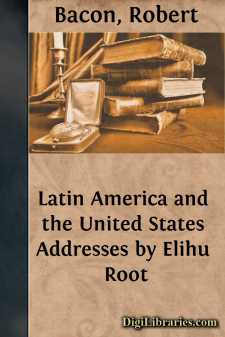Categories
- Antiques & Collectibles 13
- Architecture 36
- Art 48
- Bibles 22
- Biography & Autobiography 813
- Body, Mind & Spirit 142
- Business & Economics 28
- Children's Books 14
- Children's Fiction 11
- Computers 4
- Cooking 94
- Crafts & Hobbies 4
- Drama 346
- Education 46
- Family & Relationships 57
- Fiction 11829
- Games 19
- Gardening 17
- Health & Fitness 34
- History 1377
- House & Home 1
- Humor 147
- Juvenile Fiction 1873
- Juvenile Nonfiction 202
- Language Arts & Disciplines 88
- Law 16
- Literary Collections 686
- Literary Criticism 179
- Mathematics 13
- Medical 41
- Music 40
- Nature 179
- Non-Classifiable 1768
- Performing Arts 7
- Periodicals 1453
- Philosophy 64
- Photography 2
- Poetry 896
- Political Science 203
- Psychology 42
- Reference 154
- Religion 513
- Science 126
- Self-Help 84
- Social Science 81
- Sports & Recreation 34
- Study Aids 3
- Technology & Engineering 59
- Transportation 23
- Travel 463
- True Crime 29
Latin America and the United States Addresses by Elihu Root
by: Robert Bacon
Categories:
Description:
Excerpt
INTRODUCTORY NOTE
The collected addresses and state papers of Elihu Root, of which this is one of several volumes, cover the period of his service as Secretary of War, as Secretary of State, and as Senator of the United States, during which time, to use his own expression, his only client was his country.
The many formal and occasional addresses and speeches, which will be found to be of a remarkably wide range, are followed by his state papers, such as the instructions to the American delegates to the Second Hague Peace Conference and other diplomatic notes and documents, prepared by him as Secretary of State in the performance of his duties as an executive officer of the United States. Although the official documents have been kept separate from the other papers, this plan has been slightly modified in the volume devoted to the military and colonial policy of the United States, which includes those portions of his official reports as Secretary of War throwing light upon his public addresses and his general military policy.
The addresses and speeches selected for publication are not arranged chronologically, but are classified in such a way that each volume contains addresses and speeches relating to a general subject and a common purpose. The addresses as president of the American Society of International Law show his treatment of international questions from the theoretical standpoint, and in the light of his experience as Secretary of War and as Secretary of State, unrestrained and uncontrolled by the limitations of official position, whereas his addresses on foreign affairs, delivered while Secretary of State or as United States Senator, discuss these questions under the reserve of official responsibility.
Mr. Root's addresses on government, citizenship, and legal procedure are a masterly exposition of the principles of the Constitution and of the government established by it; of the duty of the citizen to understand the Constitution and to conform his conduct to its requirements; and of the right of the people to reform or to amend the Constitution in order to make representative government more effective and responsive to their present and future needs. The addresses on law and its administration state how legal procedure should be modified and simplified in the interest of justice rather than in the supposed interest of the legal profession.
The addresses delivered during the trip to South America and Mexico in 1906, and in the United States after his return, with their message of good will, proclaim a new doctrine—the Root doctrine—of kindly consideration and of honorable obligation, and make clear the destiny common to the peoples of the Western World.
The addresses and the reports on military and colonial policy made by Mr. Root as Secretary of War explain the reorganization of the army after the Spanish-American War, the creation of the General Staff, and the establishment of the Army War College. They trace the origin of and give the reason for the policy of this country in Cuba, the Philippines, and Porto Rico, devised and inaugurated by him....


